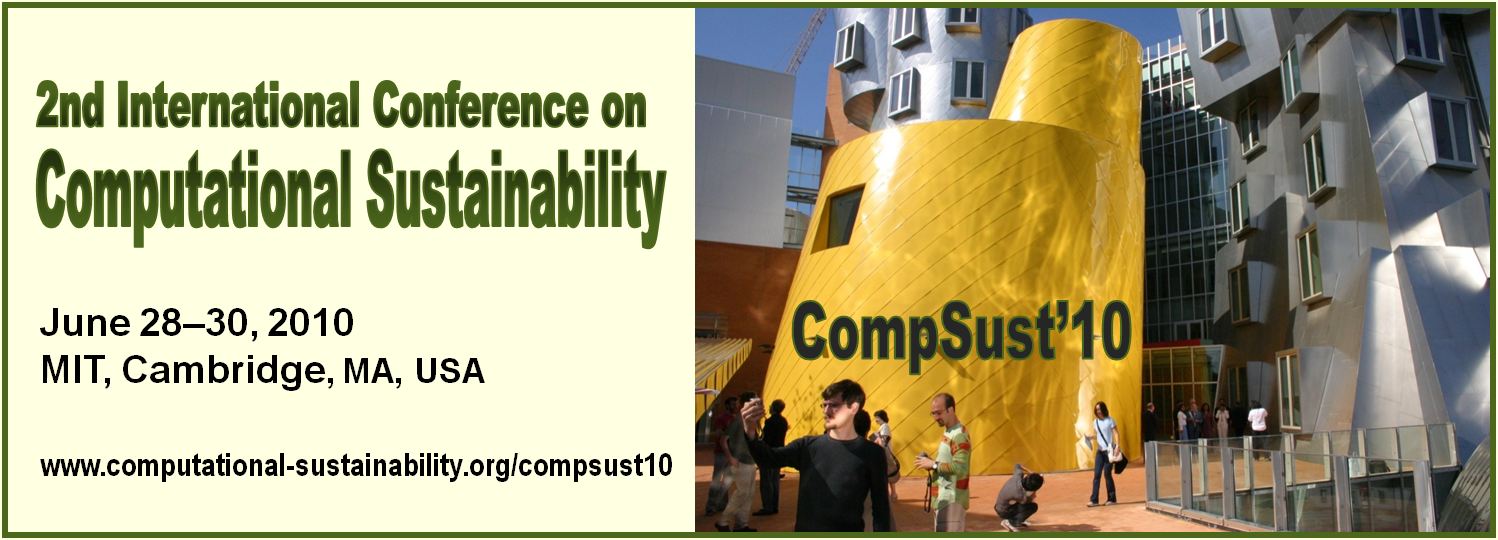CompSust'10: 2nd International Conference on Computational Sustainability
Location: Massachusetts Institute of Technology in Cambridge, MA, USA MIT Computer Science and Artificial Intelligence Laboratory, CSAIL (also known as the Stata Center and as MIT Building 32)
Date: June 28-30, 2010
Videos of conference sessions are now available
Conference Poster (8.5x11, 11x17)
The conference focuses on computational methods for balancing environmental, economic, and societal needs for a sustainable future. Through talks, discussions, poster sessions, and workshops, the conference program will investigate the major problem domains that impact global sustainability, those technologies and processes that offer the greatest opportunity to increase sustainability in these domains, and the fundamental computational methods that support these technologies and processes. Participants include representatives from national and international research institutions and government agencies.
Topics Covered
Problem domains and their corresponding and technology areas include:
- Human built systems and human impact: design, optimization, modeling and impact monitoring of human built systems; transportation, energy and resource management; energy auditing and upgrades; renewable energy sources; mining; housing and infrastructure; urban planning and land use; sustainable communities and cities; methodologies for developing countries and measurement of economic, environmental, and societal impacts (e.g.lifecycle analysis, ecological footprint, general equilibrium modeling).
- Ecosystem monitoring and modeling: sensors and sensor networks; models of ecosystem structure and function; species distribution and migration; invasive species; emerging diseases; and ecosystem services.
- Ecosystem management: policy and decision making for managing the atmosphere, water, soils, fisheries, forestry, and agriculture.
- Pollution production: greenhouse gas emissions, toxic pollutants, and agricultural runoff.
- Economics and human behavior (modeling, decision making, management policy and mechanism design): human well-being, poverty and disease, and over-population.
Computational methods include:
- Model estimation and machine learning, hidden state and mode estimation, planning and scheduling, model-based reasoning including diagnosis, repair, and maintenance, probabilistic inference, autonomous and multi-agent systems, adaptive sampling, hybrid systems, model-predictive control, decision analysis and optimization under risk, automated design, numerical analysis, cyber-security of critical infrastructure, and social networks.
Important Dates
| Early participation and doctoral consortium deadline | May 1st, 2010 |
| Notification of early acceptance | May 15th, 2010 |
| Late participation and doctoral consortium deadline | May 31st, 2010 |
| Notification of late acceptance | June 15th, 2010 |
| Conference early registration deadline | June 1st, 2010 |
| Conference | June 28th - 30th, 2010 |
Sponsors
Thanks to the Institute for Computational Sustainability, the MIT Computer Science and Artificial Intelligence Laboratory, the MIT Energy Initiative, the National Science Foundation, and Sandia National Laboratories for sponsoring CompSust'10.





